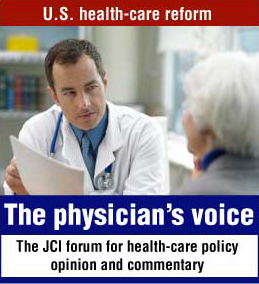Advertisement
Personal perspective Free access | 10.1172/JCI41038
A case for a science-informed perspective on health care reform
Paul Mischel
David Geffen School of Medicine at UCLA, Los Angeles, California, USA. E-mail: pmischel@mednet.ucla.edu.
Find articles by Mischel, P. in: PubMed | Google Scholar
Published September 10, 2009 - More info
J Clin Invest. 2009;119(10):2855–2855. https://doi.org/10.1172/JCI41038.
© 2009 The American Society for Clinical Investigation

Through application of powerful technologies to study genes, proteins, and metabolites in human patients, we have learned that a variety of different molecular alterations can underlie phenotypically similar diseases. An entity originally considered as one homogeneous disease more likely represents multiple pathogenic routes toward a common disease phenotype. This distinction is more than academic when drugs that target specific genetic or biochemical alterations are used as treatments. The average American does not need to understand molecular biology to recognize that their health care could be greatly affected by this. Take cancer as an example. Virtually every American will be challenged by cancer, either their own or in a loved one. We are all likely to become familiar at some point in our lives with the pain and disappointment of traditional anticancer treatments, including cytotoxic chemotherapy and radiation, that are toxic and only modestly improve the lifespan for most patients whose cancers are detected at an advanced stage. Molecular medicine promises to change this.
Studying the underpinnings of cancer has begun to yield new treatments that target specific molecular lesions needed by the cancer cells, providing the potential for much more effective, less toxic treatments. These targetable lesions are usually only present in a subset of patients with that cancer type. In fact, most patients with that type of cancer won’t benefit. Traditional metrics would put these new targeted treatments into the “doesn’t work” category, yet for patients with the specific targetable lesion, these treatments may be life saving. One can imagine a future in which each patient’s cancer is analyzed for targetable lesions and then a personalized treatment plan is tailored to best treat their disease. Thus, all Americans have a stake in the outcome. A path toward realizing this future will require forward-thinking, science-informed health care reform that develops, tests, and incorporates biomarkers into the determination of efficacy of new treatments in well-designed clinical trials so that we can better answer the question “What works and what doesn’t?” by asking, “What works for whom?” I believe that if most Americans were to recognize this fact, they would gladly invest in a process to personalize their care.
I am not an economist. I claim no expertise in understanding the full scope of budgetary issues shaping this challenge. However, I believe that this is a debate about more than just cutting costs and improving access to care. It is also an opportunity to develop a framework for evaluating new tests and treatments that are being dramatically transformed by advances in molecular medicine. As our elected leaders craft policy that will determine whether America will be a model for the seamless integration of cutting-edge science into a health care delivery system that is effective and sustainable, I hope they will: (a) recognize the impact of disease heterogeneity on evaluation of new diagnostics and treatment strategies; (b) encourage development of biomarkers to guide treatment toward patients most likely to benefit; and (c) provide support for well-designed clinical trials to evaluate their efficacy.
-
Version history
- Version 2 (September 10, 2009): No description
- Version 3 (October 1, 2009): No description



Copyright © 2025 American Society for Clinical Investigation
ISSN: 0021-9738 (print), 1558-8238 (online)
